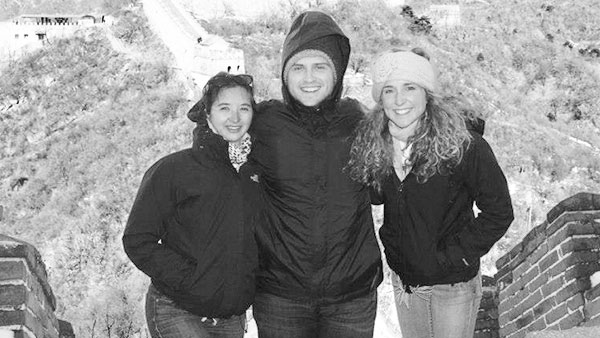On an early January morning last year in San Diego, roommates Drew Kellogg and Jordan Mancuso, who were juniors at the time, woke up to prepare for a day they both will never forget — the day they boarded the MV Explorer for 106-day trip to 16 cities in 12 countries, sailing around the world.
Semester at Sea is a global comparative study-abroad program in which about 500 to 700 students travel to more than 10 countries aboard a cruise ship each semester. The ship stops for four to six days at each port, where students are given the opportunity to explore the area, take sponsored trips or attend a field lab for one of their classes. Students can take nine to 12 credits worth of classes.
Karla Correll, assistant director of admissions at Semester at Sea, said the objective of the study-abroad program is to teach students to take chances, be independent in foreign countries and experience new cultures from all around the world.
“They want to learn more, they want to find out about themselves,” Correll said.
Correll will visit the college from 12:10–1 p.m. on Oct. 24 in the Park Auditorium to speak about the Semester at Sea programs and recruit students who are interested in taking a Semester at Sea trip.
At the event, Tom Nicholson, associate professor of media arts, sciences and studies, will present a documentary that he produced in spring of 2012 as videographer for the ship. He said the documentary was intended to publicize life on a floating university and explore some lessons students learn in the few months onboard the MV Explorer.
“I wanted to see if I could capture that when it was actually happening, or right after it happened, to catch some of the students who have had life-changing experiences,” Nicholson said.
At the beginning of the trip, Kellogg said he was encouraged to meet new people and have conversations with everyone on board because there were no electronic distractions like cellphones and laptops.
“Within the first two weeks, before we even got to Hawaii, which was our first destination, I had become better friends with the people on the ship than I had with people I had known for three years at IC,” Kellogg said.
From the moment Mancuso stepped on the ship, he jumped right into his new role as assistant videographer for the trip and met new people along the way. He said he spent time every day on the ship editing video and even taking charge of interviews and planning a few videos himself.
After about one month at sea, Kellogg said, the ship arrived at a port in Japan. He said everyone was eager to get their feet wet because they had grown tired of being stuck on the boat.
While at sea, students attended class and completed coursework, and some students had work-study programs, like staffing the computer labs and working as office assistants. Correll said the ship’s atmosphere was similar to a college campus on land. Students only took classes when they were at sea to optimize the time they could spend exploring a country while at port, Correll said.
Before the ship landed in Burma, Kellogg said he was nervous about visiting the country because of its human-rights controversy. He said he and a few friends took an eight-hour taxi drive to a small town where they stayed for six days to learn about the local culture. Kellogg said the locals were all very welcoming even though they didn’t speak the same language.
“It’s the people that inhabit it that really make it different,” he said.
Senior Kelly Parker also took the Semester at Sea trip during the Spring 2013 semester with Kellogg and Mancuso. Parker said she made a last-minute decision to attend the program. Whenever the ship arrived in port, she immersed herself in the country without any plans beforehand. She said she learned how to be a smart traveler and deal with the adversity of each country.
Parker said one of the worst things about meeting locals from other countries was telling them that she is from the U.S. Often, Parker and her friends told the locals they were from Canada or Australia to avoid unwanted conversations about U.S. culture.
“The second you tell people you’re from America, they think you’re rich, they think you’re stuck-up and they think you have opinions about the entire world,” Parker said.
Upon their return to the college, Kellogg, Mancuso and Parker all said they found it difficult to readjust to their relatively stationary lives. Parker said being able to leave the U.S. and see other cultures firsthand gave her a new perspective on her place in the world.
“I think perceptions of the countries you’re going to put a negative spin on things,” Parker said. “But if you’re smart about it, you’re going to find the positive in everything.”








